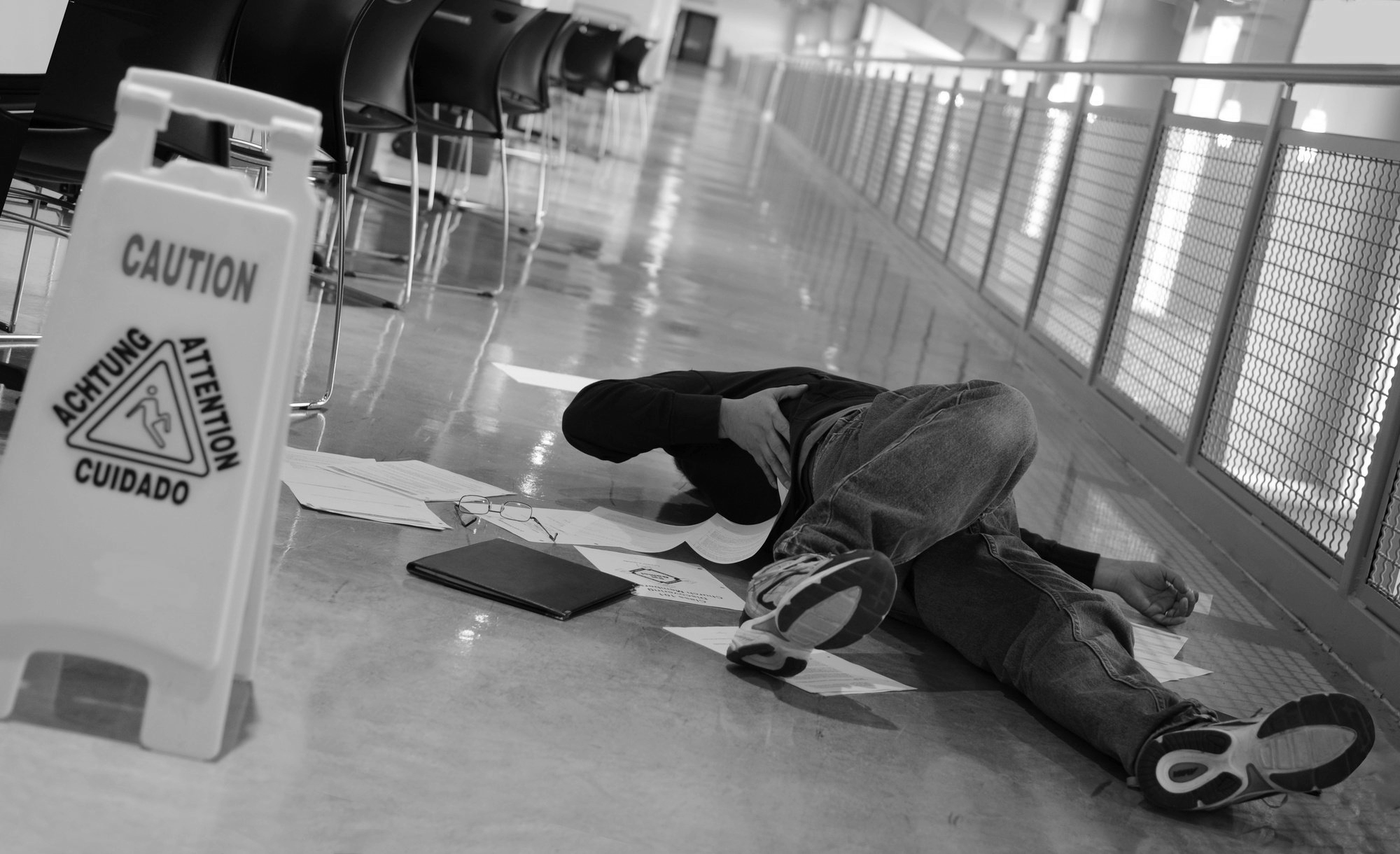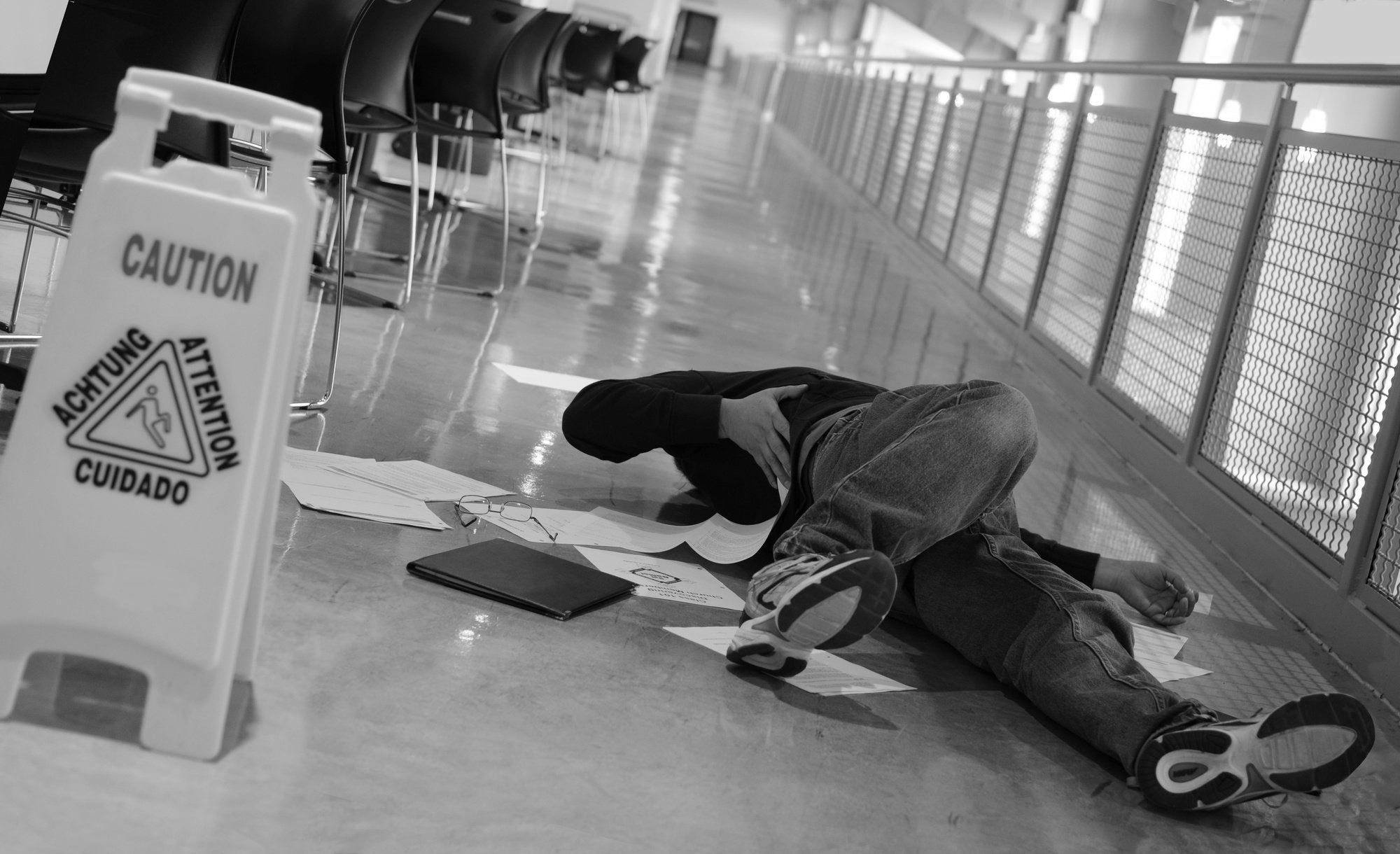
11 Questions to Ask Slip and Fall Accident Lawyers About Your Case.
- Home >
- Slips Falls >
- Articles >
- 11 Questions To Ask Slip And Fall Accident Lawyers
One moment you're on your feet, the next, you're on the ground. A slip and fall might sound trivial, but it can turn your world upside down. Picture this: an ordinary day turns into a nightmare of pain, confusion, and a cascade of medical bills. This is the harsh reality for many who experience a slip and fall accident.
Suddenly, you're not just dealing with physical pain but a daunting world of legal battles. It's a path filled with complex terms and critical decisions. This is where slip and fall accident lawyers come into play.
But with so many options and legal jargon thrown your way, how do you know who to trust? How do you ensure you're asking the right questions to find the best representation?
Understanding the vital questions to ask a personal injury attorney is the first step in navigating this challenging journey. It's not just about finding a lawyer; it's about finding the right lawyer. One who understands the nuances of personal injury law, who empathizes with your situation, and who can guide you toward the best possible outcome.
So, let's dive into the 11 crucial questions you need to ask to ensure you're on the right track.
1. What Experience Do You Have With Slip and Fall Injury Cases?
When choosing a slip and fall accident lawyer, their experience is a top priority. Don't shy away from asking about the number of slip and fall cases they've handled and their success rate.
Experienced lawyers bring a wealth of knowledge and skills specific to these cases. They should provide detailed insights into similar cases they've managed, highlighting their strategies and outcomes.
A lawyer with a solid background in slip and fall injury cases will be more adept at navigating the complex legal landscape, foreseeing potential challenges, and tailoring a winning approach for your case. Their experience also means they're familiar with the nuances of personal injury law, which can significantly impact the success of your lawsuit. An attorney's track record in handling these specific cases can give you confidence in their ability to represent you effectively.
2. How Do You Evaluate the Types of Personal Injuries?
Each slip and fall incident results in unique injuries, and understanding how a lawyer evaluates these is crucial for your case. A skilled personal injury attorney should be able to accurately assess the severity and long-term impact of your injuries. This assessment is vital for determining the course of your personal injury lawsuit.
Inquire about their process for evaluating different types of personal injuries, including:
- How they consider medical reports
- Expert opinions
- Your personal testimony
Their approach should reflect a thorough understanding of how your injury affects your daily life and future prospects. The evaluation will influence the strategy for your case, including negotiations for compensation that accurately reflects your physical and emotional suffering, medical expenses, and any lost wages due to the injury.
3. What is Your Approach to a Personal Injury Lawsuit?
Understanding an attorney's approach to handling a personal injury lawsuit is essential. This insight will give you an idea of how they plan to navigate your case, from initial consultations to potential courtroom proceedings.
Ask about their typical strategies and how they adapt to the unique aspects of each case. A competent lawyer should explain their methodology in pursuing a claim, including:
- How they gather evidence
- Interact with insurance companies
- Prepare for possible court appearances
It's important to gauge whether their approach aligns with your expectations and comfort level. Their strategy should demonstrate a balance between aggressive representation and practical, realistic planning. Knowing their approach will help you understand what to expect as your case progresses and how they intend to achieve the best possible outcome for you.
4. What Are the Potential Outcomes of My Case?
It's important to have realistic expectations about the potential outcomes of your slip and fall case. Ask your lawyer for an honest assessment of the best and worst-case scenarios.
A trustworthy attorney won't promise guaranteed results but will provide a realistic range of outcomes based on their experience with similar cases. This discussion should include potential compensation amounts, the likelihood of settling out of court versus going to trial, and the timeframe for resolving your case.
Understanding the possible outcomes will help you prepare mentally and emotionally for the road ahead. It also allows you to make informed decisions about your case and gives you a clear picture of what to expect. This transparency is crucial for building a trusting relationship with your lawyer and ensuring that you are on the same page throughout the legal process.
5. How Do You Calculate Damages for Personal Injury Cases?
Understanding how a lawyer calculates damages in personal injury cases is crucial. The method they use can significantly influence your compensation. A good lawyer should explain how they determine the value of your case, including:
- Medical expenses
- Lost wages
- Pain and suffering
Ask them to break down the process, showing how they factor in both the current and future financial impacts of your injury. Their approach should reflect a comprehensive understanding of the financial toll of your injuries, considering all the ways your life has been affected.
This calculation is not just about reimbursing expenses. It is also compensating for the emotional and physical impact of the accident. Knowing how your lawyer approaches this calculation gives you insight into what to expect in terms of potential compensation.
6. How Long Do You Expect My Case to Take?
The timeline of a legal case is often a source of anxiety for many clients. It's important to ask your lawyer for an estimated timeframe for your slip and fall case.
Experienced lawyers can offer a general timeline based on various factors, such as:
- The complexity of your specific case
- The efficiency of the court system
- The level of cooperation from all parties involved
They should provide a detailed breakdown of the different stages of the legal process. These stages typically include:
- Initial consultations
- Investigation and evidence gathering
- Filing the lawsuit
- Moving through negotiations
- Potential settlement discussions
- Possibly a trial
It's important to remember that legal proceedings can be subject to unforeseeable delays, making exact timelines difficult to predict. Factors like the availability of witnesses, the schedule of the court, and the willingness of the other party to negotiate can all impact the duration of your case. However, having a rough estimate of the timeline can be incredibly beneficial.
It helps you plan your life around the case and manage your expectations regarding the resolution. An experienced lawyer should not only be able to give you an estimated timeline but also keep you informed about any changes or developments that might affect it. This way, you can stay prepared for the journey ahead and make any necessary adjustments in your personal or professional life as the case progresses.
7. Will My Case Go to Trial?
Not all personal injury cases end up in court, and understanding the likelihood of your case going to trial is important. Ask your lawyer about their assessment of whether your case will be settled out of court or if it's likely to go to trial.
Their response should be based on their experience with similar cases and the specific circumstances of your situation. The lawyer should explain the factors that influence this decision, such as:
- The willingness of the other party to negotiate
- The strength of your case
- The potential benefits and risks of going to trial
Knowing the likelihood of a trial will help you prepare mentally and emotionally for the possible outcomes and the processes involved.
8. What Are Your Fees and How Are They Structured?
Understanding the fee structure is a critical aspect of your relationship with your lawyer. It's essential to discuss how they charge for their services. Most personal injury attorneys operate on a contingency fee basis, meaning they receive a percentage of the settlement or court award, but only if you win the case.
Ask for specific details: What percentage do they charge? Are there any upfront costs? How are expenses like filing fees, expert witness fees, and administrative costs handled?
A clear and detailed explanation of the fee structure will help you avoid any surprises down the line. It's also a good idea to compare the fee structure with the value they bring to your case.
Remember, while cost is a factor, the cheapest option isn't always the best. The right lawyer will provide a balance of cost-effectiveness and quality representation, ensuring that their fees align with the potential outcomes of your case.
9. How Will You Keep Me Informed About My Case?
Communication is key in any legal matter. You need to know how your lawyer will keep you updated about the progress of your case. Different lawyers have different communication styles and policies, so it's important to find one that suits your preferences.
Will they contact you via phone calls, emails, or in-person meetings? How frequently will they provide updates? Will there be a specific point of contact for your questions and concerns?
A good lawyer should have a clear and consistent communication plan. They should be accessible and responsive, ensuring you are never left in the dark about your case. This regular communication is crucial for your peace of mind and for maintaining transparency throughout the legal process. Make sure you're comfortable with their proposed communication strategy, as this will be a vital part of your relationship as the case progresses.
10. What Do You Need From Me for a Successful Case?
Your role and involvement can significantly impact the outcome of your slip and fall case. Try to understand what your lawyer expects from you.
What documents and information do you need to provide? Will you need to gather evidence, such as photos of the accident scene or medical records? How can you assist in building a strong case?
Your lawyer might need you to be available for meetings, provide detailed accounts of the incident, or participate in depositions. They should guide you on how to effectively contribute to your case, including avoiding certain actions that might negatively impact the outcome. Your active participation and cooperation are crucial.
The lawyer-client relationship is a partnership, and your engagement in the process can make a substantial difference in the success of your case. This question not only clarifies your role but also reinforces the collaborative nature of working together towards a common goal: a favorable resolution of your slip and fall claim.
11. Can You Provide References from Past Clients?
Asking for references from past clients is a smart move when selecting a slip and fall accident lawyer. References can give you invaluable insights into the lawyer's:
- Performance
- Professionalism
- Success rate
A trustworthy lawyer should be willing and able to provide references or testimonials from previous clients who had similar cases. These references can help you gauge the lawyer's expertise and effectiveness in handling slip and fall cases.
When speaking with these references, inquire about their overall experience, how the lawyer communicated with them, the strategies used, and the outcome of their case. Also, ask about their satisfaction with the legal representation they received and whether they would recommend the lawyer.
This feedback is crucial in making an informed decision. It's not just about the lawyer's knowledge and skill, but also about their ability to connect with clients, understand their needs, and deliver favorable results.
This final question rounds out your understanding of the lawyer's capabilities. It ensures you choose someone who has a proven track record of success and client satisfaction in slip and fall injury cases.
Securing the Right Representation With Slip and Fall Accident Lawyers
Choosing the right slip and fall accident lawyer is a pivotal step in your journey toward justice. By asking these questions, you're not just choosing a lawyer; you're choosing a partner in navigating this challenging experience. Remember, the right lawyer can make all the difference in your quest for fair compensation.
Ready to take the next step? Reach out to our highly experienced slip and fall accident lawyers today at Roberts Lambert and start your journey towards recovery and justice.
Meet the author.







